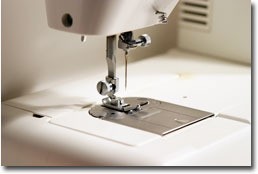Gather and purchase all of the supplies necessary to complete your sewing or craft project ahead of time. Having to stop in the middle of the project in order to run out and get a forgotten essential item is time consuming and irritating.
Double check the threading of your sewing machine to prevent immediate stitching problems. Breaking thread or skipped stitches right off the bat can cause you to lose interest in the project, not to mention the time lost in fixing the problem. And speaking of thread, always use a good quality thread. "Cheap" thread will fray, break and cause knotting of the thread while sewing.
It is a mistake to simply use the same needle for everything you sew until it breaks. Some fabrics require a fine needle while heavier duck type or denim fabrics require a heavier needle. Keep a supply of assorted machine needles handy so you'll have the correct needle for the fabric you'll be using. In addition, if you hit a pin, you should immediately change the needle. A bent needle, even if only "slightly" bent or nicked can cause skipped stitches and can quite possibly cause damage to your fabric.
All pattern pieces have grainline markings. The grainline should run parallel with the length of the fabric. If you simply lay the pattern pieces anywhere on the fabric, ignoring the grain- lines, the finished garment will not hang right. The extra few minutes spent laying the pattern pieces correctly and cutting the seam lines precisely will result in a professional looking garment you will be proud of.
If your project or garment includes a technique you are not familiar with, or haven't done in quite some time, such as buttonholes or flat felled seams, practice on a piece of extra fabric. It would be best to make two or three practice samples before actually sewing on the garment itself.
It only takes a second to clip the stitches from the beginning and end of the seams. If you wait until the garment is finished it will become a chore and you may be tempted to leave them, resulting in an unprofessional looking garment. Be sure to have a waste basket handy, or tape a small lunch bag to the side of your sewing machine table in which to toss the threads after clipping.
Pressing the seams during the sewing process will produce a more professional looking garment, and will also make it easier to sew the seams that will "cross" any of the seams already sewn. Gently open the seams and press flat. You will save time if you sew several seams, then press them all at once, before moving on to the next step.
Clean up the sewing area after each project. A great motto for your sewing/craft area is "a place for everything and everything in its' place". Put things away - left over fabric in a scrap box or drawer, scissors, pins and thread back in the drawer. The sewing room will look much better and an organized sewing area is much more inviting than a messy, piled up area with only a "path" to the sewing machine.

About The Author: Sarah J. Doyle is author of over 25 sewing, craft and how-to books, as well as author of online pattern making, sewing and craft classes. Visit http://SewWithSarah.com for information on books, classes, newsletters and the latest hints and tips. and http://SarahJDoyle.com for additional FREE articles.
(c) Copyright 2003, Sarah J. Doyle. All Rights Reserved.
Add your voice! Click below to comment. ThriftyFun is powered by your wisdom!